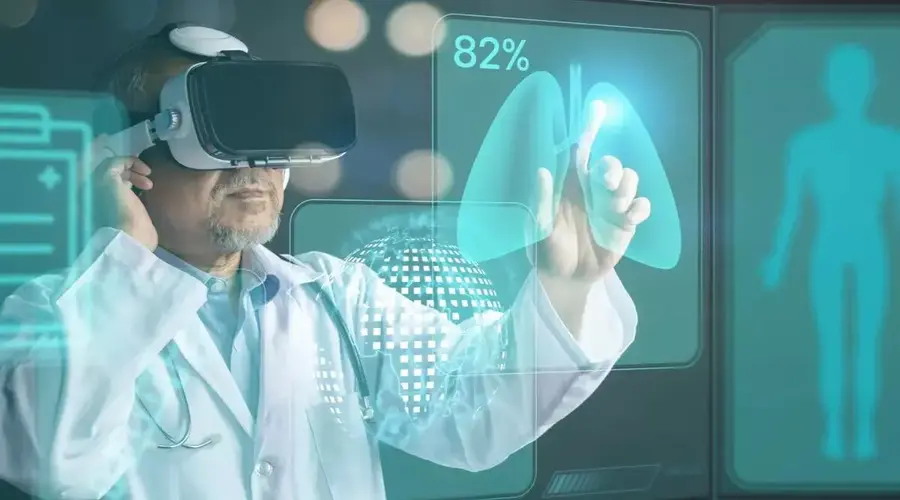The digital realm continues to evolve, shaping the way we live, work, and interact. With the advent of the metaverse, a virtual space combining augmented and virtual reality, the possibilities seem endless. While the metaverse has primarily been associated with gaming and entertainment, there is a growing interest in integrating health tracking and monitoring technologies within this immersive environment. In this article, we will explore the emergence of health tracking and monitoring technologies in the metaverse, their benefits and challenges, and their potential impact on our well-being.
Introduction
In recent years, the popularity of health tracking devices and applications has soared. From step counters and heart rate monitors to sleep trackers and calorie counters, these technologies have become an integral part of our everyday lives. In the metaverse, these technologies take on a new dimension, enabling users to monitor their health and well-being within virtual environments.
The Significance of Health Tracking in the Digital World
The integration of health tracking technologies in the metaverse holds great promise. As individuals spend increasing amounts of time in virtual spaces, it becomes crucial to prioritize their health and well-being. Health tracking devices can provide valuable insights into various biometric data, including heart rate, sleep patterns, and physical activity levels, enabling users to make informed decisions about their lifestyle choices.
Emerging Technologies for Health Tracking in the Metaverse
Wearable Devices and Smart Clothing
Wearable devices such as smartwatches, fitness bands, and even smart clothing have become popular accessories for health-conscious individuals. These devices can seamlessly track various aspects of a user’s health, including heart rate, sleep quality, and activity levels. In the metaverse, these wearables can sync with virtual reality headsets or augmented reality glasses, providing users with real-time biometric feedback during their virtual experiences.
Augmented Reality (AR) and Virtual Reality (VR) Applications
AR and VR technologies are transforming the way we perceive and interact with digital content. In the context of health tracking, these technologies can create immersive environments that encourage physical activity, monitor vital signs, and provide real-time feedback. For example, VR exercise programs can simulate outdoor activities while tracking movement and heart rate, making workouts more engaging and personalized.
Biofeedback Sensors and Implantable Devices
Advancements in biofeedback sensors and implantable devices offer exciting possibilities for health tracking in the metaverse. Biofeedback sensors can measure a range of physiological signals, such as brainwaves, muscle tension, and skin conductance, providing users with insights into their emotional and mental states. Implantable devices, although still in the early stages of development, could revolutionize health tracking by seamlessly integrating with the user’s body and collecting data at a deeper level.

Benefits and Challenges of Health Tracking in the Metaverse
- Improved health awareness and self-management
By incorporating health tracking technologies into the metaverse, individuals can gain a deeper understanding of their physical and mental well-being. Real-time feedback on biometrics and health-related behaviors can empower users to make positive changes in their lifestyles, leading to improved overall health and well-being.
- Enhanced virtual experiences and immersive environments
Health tracking technologies in the metaverse can enhance the virtual experience by providing personalized feedback and adapting the content to the user’s health needs. For instance, virtual reality games can dynamically adjust the difficulty level based on the user’s heart rate or encourage breaks to prevent excessive screen time.
- Privacy and data security concerns
As health data becomes increasingly digital, privacy and data security become paramount. Health tracking in the metaverse raises concerns about data collection, storage, and potential misuse. Safeguarding personal health information and ensuring transparent data practices are essential for building trust among users.
- Ethical considerations and potential risks
The integration of health tracking in the metaverse raises ethical considerations, such as the potential for addiction or the unintended consequences of gamifying health. Striking a balance between promoting healthy behaviors and avoiding undue pressure or obsessive monitoring is crucial.
Integrating Health Tracking Technologies into the Metaverse
Gamification of Health and Fitness
Gamification has proven to be an effective strategy for encouraging behavior change and engagement. In the metaverse, gamifying health and fitness can make physical activity more enjoyable and motivate users to reach their goals. Leaderboards, virtual rewards, and social challenges can foster a sense of competition and community, further incentivizing users to adopt healthy habits.
Virtual Healthcare and Telemedicine
The metaverse has the potential to revolutionize healthcare delivery. Virtual healthcare and telemedicine platforms can leverage health tracking technologies to provide remote consultations, monitor chronic conditions, and facilitate preventive care. This has the potential to improve access to healthcare, especially for individuals in remote areas or those with limited mobility.
Personalized Health Monitoring and Analytics
Health tracking technologies in the metaverse can generate vast amounts of data. By leveraging artificial intelligence and machine learning algorithms, this data can be transformed into actionable insights. Personalized recommendations, health trends analysis, and early detection of potential health issues can empower individuals to take proactive steps towards improving their well-being.
Promoting Healthy Behaviors and well-being in the Metaverse
Fitness and Exercise in Virtual Environments
Virtual reality exercise programs and interactive games offer exciting opportunities for physical fitness. By simulating real-world activities and providing real-time feedback, users can engage in enjoyable workouts without leaving their homes. Virtual fitness communities and trainers can provide motivation and guidance, fostering a sense of accountability and support.
Mental Health and Stress Management Tools
The metaverse can serve as a refuge for individuals seeking stress relief and mental well-being. Guided meditation applications, virtual therapy sessions, and immersive relaxation experiences can help users manage their mental health. By combining immersive environments with evidence-based therapeutic techniques, the metaverse can offer unique solutions for combating stress, anxiety, and depression.
Social Support and Community Engagement
Community support plays a vital role in maintaining health and well-being. In the metaverse, users can join virtual communities centered around specific health goals or interests. Engaging with like-minded individuals, sharing experiences, and receiving encouragement can boost motivation and foster a sense of belonging.
Future Prospects and Trends in Health Tracking in the Metaverse
- Advancements in wearable technology and miniaturization
As technology continues to evolve, we can expect wearable devices to become more sophisticated, compact, and seamlessly integrated into our daily lives. Miniaturization and advancements in sensors will enable the development of wearables that are comfortable, discreet, and capable of tracking a wide range of health parameters.
- Integration of artificial intelligence and machine learning
Artificial intelligence and machine learning algorithms will play a crucial role in making sense of the vast amount of health data generated in the metaverse. These technologies will enable more accurate predictions, personalized recommendations, and early detection of health issues, revolutionizing preventive care and self-management.
- Evolution of virtual worlds and social platforms
Virtual worlds and social platforms in the metaverse will continue to evolve, providing increasingly immersive and interactive experiences. Health tracking technologies will become an integral part of these environments, seamlessly blending real-world health monitoring with virtual interactions and activities.
Conclusion
Health tracking and monitoring technologies are finding their way into the metaverse, creating exciting opportunities for individuals to prioritize their well-being within virtual environments. From wearable devices and immersive experiences to personalized analytics and telemedicine, the integration of health tracking in the metaverse holds immense potential. However, it is essential to address the challenges of privacy, data security, and ethical considerations to ensure the responsible and beneficial use of these technologies.
FAQs
1. Can health tracking technologies be used for medical diagnosis?
Health tracking technologies in the metaverse primarily focus on providing users with insights into their well-being and promoting healthy behaviors. While these technologies can monitor various biometrics, they should not be considered a substitute for professional medical diagnosis. Consultation with healthcare professionals is necessary for accurate diagnosis and treatment.
2. What are the potential privacy concerns associated with health tracking in the metaverse?
Privacy concerns arise from the collection, storage, and sharing of personal health data. It is crucial for companies to implement robust data protection measures, obtain informed consent from users, and provide transparent information about data usage. Users should also be cautious when sharing health information on public platforms and ensure that they are aware of the privacy policies in place.
3. How accurate are health tracking devices in measuring biometrics?
The accuracy of health tracking devices can vary depending on the specific device, manufacturer, and technology used. While many devices provide reasonably accurate measurements, it’s important to understand their limitations. Users should consider factors such as device calibration, placement on the body, and environmental conditions that may affect accuracy.
4. Are there any health risks associated with prolonged use of virtual reality devices?
Extended use of virtual reality devices may lead to discomfort, motion sickness, eye strain, or fatigue in some individuals. It’s essential to take regular breaks, adjust the device settings to optimize comfort, and follow usage guidelines provided by manufacturers. Individuals with pre-existing medical conditions should consult with healthcare professionals before using virtual reality devices extensively.
5. What are some popular health tracking apps and devices available in the market?
There are numerous health tracking apps and devices available in the market, catering to different health goals and preferences. Some popular options include fitness trackers like Fitbit and Apple Watch, sleep tracking apps like Sleep Cycle and Pillow, and meditation apps like Headspace and Calm. It’s important to research and choose devices or apps that align with specific health needs and offer reliable data insights.

